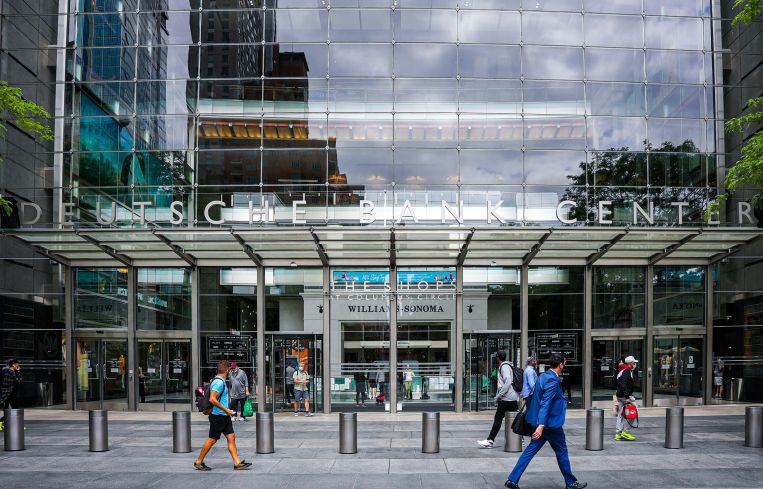Deutsche Bank Enabled Ponzi Scheme Tied to Florida Properties: Lawsuit
The scheme resulted in hundreds of millions of dollars of investor losses, the lawsuit alleges
By Celia Young July 23, 2021 2:47 pm
reprints
A lawsuit accused Deutsche Bank of allowing or willfully ignoring a “massive” Ponzi scheme that defrauded investors in fraudulent Florida properties for at least six years.
The suits — filed by the liquidators of two bankrupt, Cayman Island investment funds in New York and Florida — claim the bank supported two companies that defrauded investors, leading to hundreds of millions of dollars in losses, Bloomberg first reported.
“As we have maintained, these claims lack merit and we will continue to vigorously defend ourselves,” a Deutsche Bank spokesman said in a statement to Commercial Observer.
The suit filed in Florida claims that Deutsche Bank continued to maintain accounts for the two companies and failed to enforce its own policy to prevent money laundering, even after the U.S. Securities and Exchange Commission (SEC) hit them with sanctions.
“Although accomplished through a shifting and complex series of entities, the essence of the wrongdoing was simple — trick victims into investing money, divert the profits, and recruit new victims to continue and conceal the scheme,” the complaint filed in Florida on July 6 said. “And it succeeded because the Defendants [Deutsche Bank] failed to do what the law and the Defendants’ highly touted business model required.”
The shifting entities center around two companies — South Bay Holdings and Biscayne Capital International. South Bay labeled itself as a South Florida real estate developer and Biscayne as a firm to raise capital for South Bay.
The Florida suit alleges that the two companies created special purpose vehicles to issue notes to investors that were backed by South Bay’s real estate assets, but, in reality, the properties were laden with more debt than equity and the notes were unsecured.
The money raised through those notes was used to offset losses in real estate investments; pay property mortgages; fund unrelated and undisclosed investments; and enrich the principles of the companies, their family and associates, the Florida suit claims. And, when money was low, the principals would raise more funds by issuing new notes.
The Ponzi scheme goes back to before the 2008 recession, which caused the Biscayne companies’ founders to expand their scheme with more special purpose vehicles to issue more notes to investors in order to pay original investors, the suit says. Deutsche Bank was the issuing agent of shares in 2009 of one of the companies connected to Biscayne, according to the Florida suit.
In 2012, the SEC opened an investigation into Biscayne Capital, and the principals opened a new company, Madison Asset, in the Cayman Islands with bank accounts with Deutsche Bank, per the Florida suit.
The suit alleges that the bank did nothing after Madison Asset made several suspicious and unauthorized transfers of millions of dollars from their accounts. In 2016, the SEC found that Biscayne had violated the law by not disclosing the fact that the companies were all owned by a common group of people, and imposed financial penalties and sanctions, but Deutsche Bank continued their relationship with the company, the Florida suit alleges. Deutsche Bank terminated the relationship with the Biscayne companies in June 2017, according to the suit.
The two complaints — filed last year by the liquidators of Madison Asset, and this month by the liquidators of Biscayne and its associated companies — raise concerns over the bank’s money-laundering controls.
Deutsche Bank was the primary bank for Biscayne and other companies, and the suit claims that it either knew about the wrongdoing or willfully turned a blind eye to the fraud in its six-year relationship with the entities.
Two people, including the person who opened a Deutsche Bank account for Madison Asset in 2014, have already pleaded guilty to U.S. money-laundering charges, Bloomberg reported.
The global banking giant has paid out billions to resolve criminal and civil cases through years of dealing with claims of relaxed internal controls, and the U.S. Federal Reserve recently criticized Deutsche Bank for compliance failures, Bloomberg reported.
Deutsche bank has faced similar suits in the past, however, and has gotten them dismissed in court.
A federal judge dismissed a lawsuit accusing the global lender of hiding deficiencies in its anti-money laundering controls in 2017, even as Deutsche Bank allowed a form of trading called “mirror trades” to launder money out of Russia as part of a $10 billion trading scheme, Reuters reported. The decision came after the bank agreed to pay close to $630 million of fines to settle U.S. and British charges that it allowed billions of trades that may have avoided Russia controls from 2011 to 2015.
Celia Young can be reached at cyoung@commercialobserver.com.



